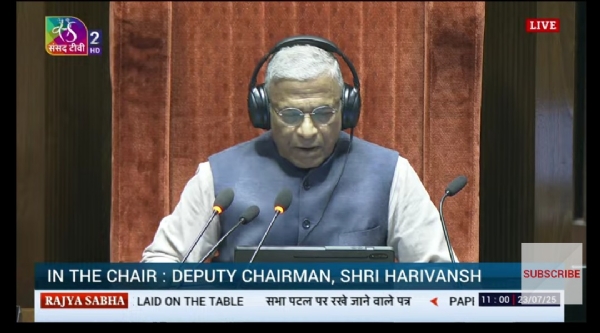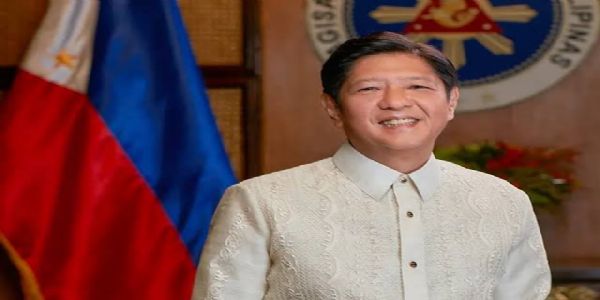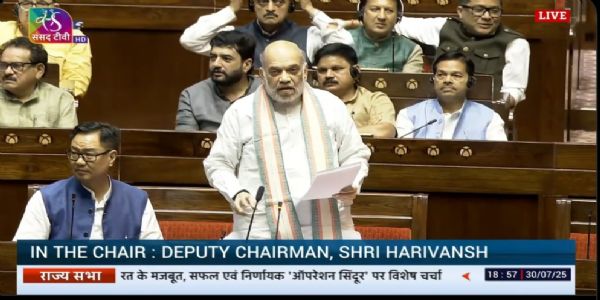
Delhi, 30 July (H.S.): On Wednesday morning, members of the INDIA bloc staged a protest within the Parliament complex at Makkar Dwar at 10:30 AM to express their opposition to the Election Commission’s Special Intensive Revision (SIR) of electoral rolls in Bihar. Concurrently, the Lok Sabha agenda indicated that Union Home Minister Amit Shah would introduce a resolution to extend President’s rule in Manipur, a state recently affected by ethnic violence. Alongside this motion, Union Minister of Ports, Shipping, and Waterways, Sarbananda Sonowal, planned to present the Merchant Shipping Bill.
Rajya Sabha Deputy Chairman Harivansh addressed notices submitted by Opposition MPs regarding the Bihar electoral revision, allegations against Bengali migrants, and the arrest of two nuns in Chhattisgarh. He dismissed these notices and adjourned the House until noon. Union Minister for Communications, Jyotiraditya Scindia, responded to inquiries concerning cybercrime measures, revealing that Sanchaar Sathi has disconnected 2.9 million phone numbers, blocked 550,000 handsets, and identified 24,000 fraudulent WhatsApp accounts. He also highlighted a significant crackdown on fraudulent mobile connections, with 13.6 million connections having been disconnected.
Scindia discussed a dedicated app designed to prevent theft of mobile handsets, which has facilitated the filing of 4.5 million reports, leading to the recovery of 560,000 phones. He further addressed the fraudulent international call system, detailing that it blocked 13.5 million spoofed calls within its first day of operation. Congress raised concerns regarding the lack of investigations and arrests following the Enforcement Directorate’s (ED) searches in Assam and Meghalaya linked to illegal coal syndicates. In response, Minister of State for Coal, Satish Chandra Dubey, claimed the topics raised were unrelated to the Question Hour’s agenda.
During the Parliamentary session, the Minister of State at the Prime Minister’s Office reported a considerable increase in the Indian space economy, which had jumped from being the tenth largest to the fourth largest globally, aiming for leadership status. He noted that space startups have grown from single digits to over 300, with some achieving substantial entrepreneurial success. He emphasized the role of non-fossil fuels in India's energy landscape, asserting that half of India's installed capacity was now operated on non-fossil sources, surpassing goals set for 2030 by five years, particularly in solar energy, which increased from 2.42 GW in 2014 to 130 GW currently.
Speaker Om Birla stated he had not permitted any adjournment motions, offering members a chance to discuss issues during the Zero Hour in Lok Sabha.
External Affairs Minister S. Jaishankar spoke about the Indus Water treaty, criticizing former Prime Minister Jawaharlal Nehru for what he termed appeasement towards Pakistan, asserting that terrorism and hostility had only escalated since the treaty was signed. He detailed India’s historical approach to responding to terrorism, highlighting the inconsistency of resuming dialogue after terror attacks, and challenged the narrative of India's relationship with Pakistan.
In response to accusations of India's hyphenation with Pakistan, Jaishankar argued that India’s engagement in global forums had changed the perception of its stance against terrorism. He remarked that the recent discussions in these forums acknowledged the involvement of terror groups linked to Pakistan's infrastructure. He confirmed that there has been no external pressure on India to cease operations against terrorism, particularly presenting a firm stance on bilateral relations with Pakistan and asserting
any discussions on conflict resolution needed to go through formal channels.
There was no leader anyone in the world who told India to stop its Operation. There was no linkage of trade in any of these conversations. There were no calls between Prime Minister and President Trump from April 12 to June 12”said EAM.
During the debate, Jaishankar compared the Modi administration's success in addressing terrorism on a global platform to the previous UPA government's record, highlighting the acknowledgment of terrorist organizations in UN discussions. He emphasized that India would not tolerate terrorism, increasing its international stature, and insisted that India had taken proactive measures against terror networks in Pakistan.
EAM S Jaishankar, in Rajya Sabha, asserted that blood and water cannot coexist, referencing the suspension of the Indus Water Treaty with Pakistan after the Pahalgam terror attack that resulted in 26 fatalities. He emphasized that India has confronted cross-border terrorism since 1947 and claimed that the Modi government has rectified the shortcomings of Nehru's policies by suspending the treaty, which he described as appeasement rather than a means for peace.
Jaishankar further noted that global awareness of terrorism has been enhanced by the government's efforts and highlighted India's pressure on Pakistan through the Financial Action Task Force (FATF). He pointed out the UN's acknowledgment of The Resistance Front (TRF) as a Pakistan-based Lashkar-e-Taiba proxy and mentioned that Indian diplomacy led to the US designating TRF as a terrorist outfit. On the topic of Op Sindoor, he asserted that India won't accept nuclear blackmail and will respond decisively to any attacks from Pakistan.
Jaishankar also revealed that US Vice President informed Prime Minister Modi about a planned massive attack from Pakistan, while noting the lack of communication between Modi and Trump during a critical period. He concluded by urging that the effects of Op Sindoor could be seen in the aftermath of terrorist funerals and the damage to Pakistani airfields.
In a parallel discussion in the Lok Sabha, Congress MP K.C. Venugopal expressed deep concerns regarding the arrest of two nuns in Chhattisgarh after they were accused of human trafficking and religious conversions by members of Bajrang Dal. Venugopal alleged they were unfairly detained despite their work in providing healthcare to needy populations, asserting that their detention was based on “false accusations.” He criticized the government's inaction in response to repeated appeals for their release, likening the situation to a banana republic due to the unjust treatment faced by the nuns.
The topic of religious conversion and trafficking was also raised by BJP MP Kashyap, who asserted that tribal women were being trafficked for religious conversions, accusing the Opposition of shielding such activities. The ongoing discussions in Parliament illustrated the complexities and conflicts surrounding political, social, and security issues in India, showing the contentious landscape amidst legislative proceedings.
---------------
Hindusthan Samachar / Jun Sarkar








